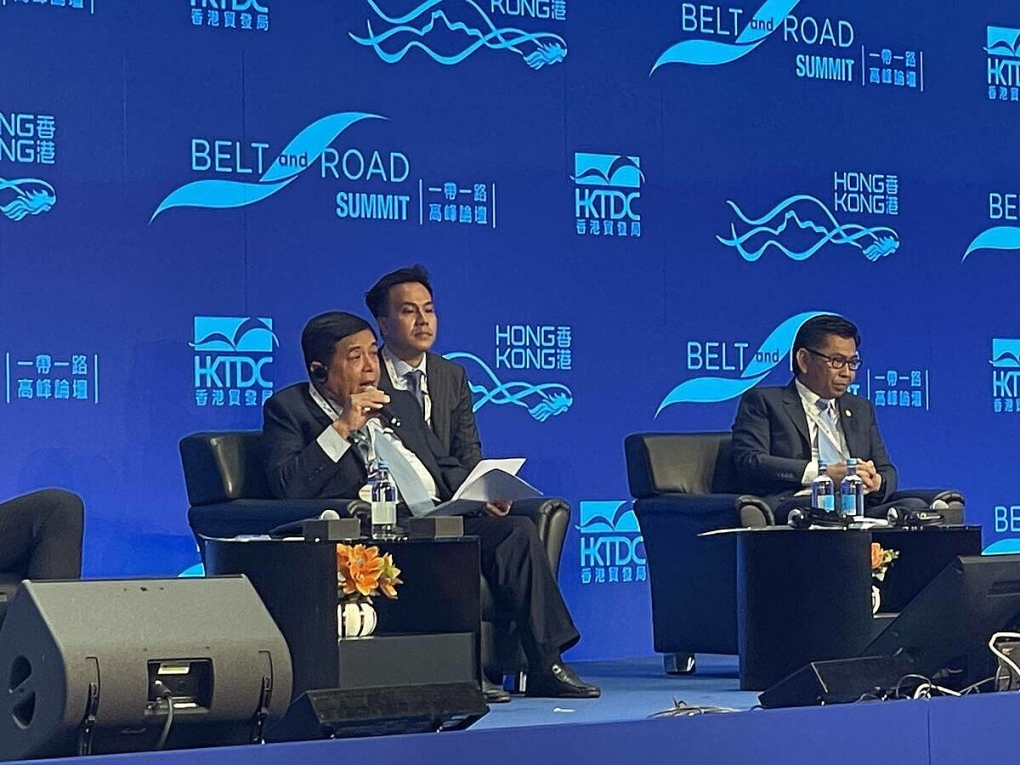Vietnam facilitates China-Southeast Asia economic cooperation
Vietnam called on the parties involved in the Belt and Road Initiative to strengthen policy alignment, share experiences in fostering the digital and green economy, and develop new models.
Cooperation between Vietnam and China under the Belt and Road Initiative framework holds significant value in advancing regional collaboration and connectivity, said Vietnam's Minister of Planning and Investment (MPI) Nguyen Chi Dung at the 8th Belt and Road Summit held in Hong Kong (China) on September 13-14.
| Vietnam's Minister of Planning and Investment Nguyen Chi Dung at the summit. Source: MPI |
The summit, which marked the 10th anniversary of the Belt and Road Initiative, was attended by nearly 6,000 senior government officials and business leaders from 70 countries and regions.
Minister Dung highlighted Vietnam's role as a vital link between China and Southeast Asian nations.
He added that the MPI, in conjunction with China's National Development and Reform Commission, is actively working on finalizing negotiations regarding the Connectivity Plan within the Two Corridors, One Belt framework, and the Belt and Road Initiative.
Dung also noted that in the context of continuously improving Vietnam-China relations, economic cooperation and integration between the two nations are making solid progress.
Chinese investors have engaged in nearly 4,000 projects in Vietnam, pouring a total capital of US$26 billion as of August. Over the past eight months alone, China injected a substantial $2.7 billion, making it the second-largest investor in Vietnam.
Regarding trade, China consistently holds the position of Vietnam's primary partner, serving as both the largest source of goods and the second-largest export market.
The Belt and Road Initiative, as the minister pointed out, is evolving in a new landscape. He stressed the importance of taking into consideration emerging trends such as the Fourth Industrial Revolution, digital transformation, and sustainability initiatives. These trends are reshaping the global supply chain, offering opportunities to enhance cooperation among China, Vietnam, and Southeast Asian nations in institutional and infrastructural development.
For the Belt and Road Initiative to remain a driving force for regional cooperation and development, Dung called on the parties involved to strengthen policy alignment, share experiences in fostering the digital and green economy, and develop new models.
In addition, countries should expedite the interconnection of transportation networks, particularly railways, to facilitate trade and ensure open access to goods and agricultural products.
The minister stressed the necessity of fostering a spirit of equitable benefits, shared risks, equality, mutual gain, and respect for international law among the participating nations.
Furthermore, during the policy discussion session, the minister provided an update on Vietnam's economic development. He emphasized that Vietnam offers a stable political environment, a substantial market, and a rich pool of human resources, making it an attractive prospect for investors.
On the sidelines of the summit, Dung held meetings with dignitaries, including Hong Kong Chief Executive John Lee Ka-chiu and the UAE Minister of Economy. He also engaged with various business leaders and economic groups of Sunwah, Swire Pacific, and Jardine Matheson.
Launched by China in 2013, the Belt and Road Initiative is designed to bolster regional cooperation and connectivity across five key areas: policy, transportation, finance, trade, and people-to-people connections. Over the past decade, the initiative has garnered participation and collaboration from over 100 economies and international organizations, leading to the implementation of more than 3,000 projects globally, with a combined capital investment of nearly $1 trillion.












